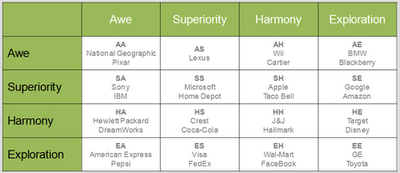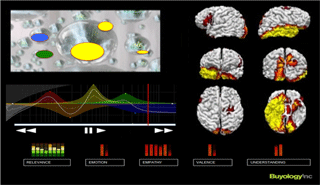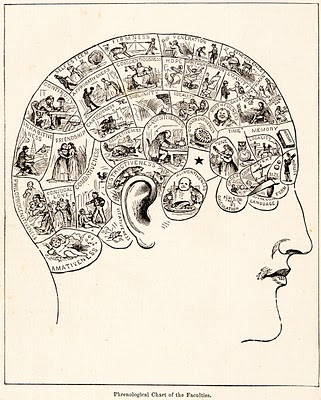Neuroscience

Four by four matrix of Neurotypes™ according to Buyology Inc™
Neuromarketing firm Buyology Inc™ has released its Most Desired U.S. Brands Report:
The Brand Most Desired by Men in the U.S. is Crest? Hyundai (#5) is more desirable than Lexus (#10)? Really? Roger Dooley discussed these and some of the other less predicted [i.e., completely surprising] findings at his Neuromarketing blog, noting that "The actual methodology used to produce this brand ranking is a bit sketchy."
So what are the elusive Neurotypes™?
I'm reminded of the four personality types according to chemistry.com:

Each of these chemistry types is associated with a dominant neurotransmitter or hormone (serotonin, testosterone, dopamine, estrogen), according to resident anthropologist Dr. Helen Fisher. Although a simplistic caricature of personality differences, at least the proposed biological correlates are obvious.
But where does the neuro enter the marketing picture for Neurotypes™?

Of course, we'll never be able to evaluate any of this, because the proprietary research is not peer reviewed. So it's black box phrenology, without the convenient localization map of its ancestors.

- Do We Really Love Our Favourite Brands The Same Way We Love People?
People can get awfully attached to their preferred brands. Some tattoo logos on their skin, others camp out overnight to buy the latest products. Late in life, people often still favour and trust brands from their youth. But is brand obsession and attachment...
- Is It Worth Hiring David Beckham To Promote Your Brand? A Psychological Test
He's probably the most famous man on the planet, but the problem is there's no chance of exclusivity. Beckham already endorses a string of products from the Emporio Armani fashion label to Burger King. So is it worth hiring him to endorse your...
- Does Owning An Ipod Make You Happy?
As Apple launches its latest shiny products and the media work up their usual lather of excitement, a timely study has tackled the question of whether owning an iPod digital music player will make you happy. Antje Cockrill surveyed 241 people (mostly...
- Humour Reduces Our Resistance To Aggressive Marketing
Whether it's messages on smartphone Apps or the old fashioned way on billboards, radio and TV, advertisers bombard us relentlessly. Fortunately, our brains have an inbuilt BS-detector that shields us from the onslaught - a mental phenomenon that psychologists...
- Brands Leave Their Mark On Children's Brains
The idea may be "unpalatable", but companies seeking an edge over their rivals should ensure that children are exposed to their brands as early in life as possible. That's according to Andrew Ellis and colleagues, whose new research shows that the...
Neuroscience
Buyology Phrenology?

Four by four matrix of Neurotypes™ according to Buyology Inc™
Neuromarketing firm Buyology Inc™ has released its Most Desired U.S. Brands Report:
Here are the top 5:Johnson & Johnson, Sony, Mastercard and Kleenex Most Desired Brands for WomenFebruary 2, 2011 (New York, NY) – Johnson & Johnson, Sony, Crest and BMW appear at the top of the First Annual "Most Desired Brands in the U.S." Report. The report, released by leading global strategic neuromarketing firm Buyology Inc, is the first to quantitatively type and measure consumer relationships with brands. The full report can be found at www.buyologyinc.com.The Most Desired U.S. Brands Report is the result of more than 6 years and $8 million, testing 240 global brands with more than 5000 consumers.
Amazon Beats Walmart as the Most Desired Retailer
BMW, Hyundai and Lexus Among Most Desired Brands for Men
| Rank | Women | Men |
| #1 | Johnson & Johnson | Crest |
| #2 | Sony | BMW |
| #3 | Kleenex | National Geographic |
| #4 | National Geographic | Panasonic |
| #5 | MasterCard | Hyundai |
The Brand Most Desired by Men in the U.S. is Crest? Hyundai (#5) is more desirable than Lexus (#10)? Really? Roger Dooley discussed these and some of the other less predicted [i.e., completely surprising] findings at his Neuromarketing blog, noting that "The actual methodology used to produce this brand ranking is a bit sketchy."
So what are the elusive Neurotypes™?
Neurotypes™ quantitatively determine which of sixteen relationships a brand or business currently has for a given target audience and the relative strength of the relationship, or signal strength, relative to competitors and other, beacon brands who, although they may be outside the category, have successfully established similar relationships. Once typed and calibrated, a marketer can use Neurotypes to assess the impact of their current marketing activities, determine what activities will be more effective in the future and gain provocative and proprietary insights on how to strengthen the brand's relationships across the 6P framework (product, package, placement (distribution), price, promotion and positioning).The Neurotype™ matrix yields a few surprises of its own. Taco Bell relates to its audience through Superiority and Harmony [just like Apple]. In contrast, Crest exploits the winning combination of Harmony and Superiority. Wal-Mart has a relationship of Exploration and Harmony with its customers [just like Facebook].
I'm reminded of the four personality types according to chemistry.com:

Each of these chemistry types is associated with a dominant neurotransmitter or hormone (serotonin, testosterone, dopamine, estrogen), according to resident anthropologist Dr. Helen Fisher. Although a simplistic caricature of personality differences, at least the proposed biological correlates are obvious.
But where does the neuro enter the marketing picture for Neurotypes™?
Buyology has developed proprietary physiological measurements based on brain and eye reaction to marketing stimulus that directly impacts in-market performance. These measures are collected either via Central Location Testing utilizing medical grade EEG and state-of-the art eye tracking equipment or via a global pre-recruited in-home panel via web-based stimuli and Bluetooth EEG collection equipment. The in-home methodology is web based, scalable and offers the client very quick results at a much lower cost while still providing superior results gathered in a more natural, in-home environment.
Non-conscious Marketing Stimuli Testing Output

Of course, we'll never be able to evaluate any of this, because the proprietary research is not peer reviewed. So it's black box phrenology, without the convenient localization map of its ancestors.

An 1883 phrenology chart.
- Do We Really Love Our Favourite Brands The Same Way We Love People?
People can get awfully attached to their preferred brands. Some tattoo logos on their skin, others camp out overnight to buy the latest products. Late in life, people often still favour and trust brands from their youth. But is brand obsession and attachment...
- Is It Worth Hiring David Beckham To Promote Your Brand? A Psychological Test
He's probably the most famous man on the planet, but the problem is there's no chance of exclusivity. Beckham already endorses a string of products from the Emporio Armani fashion label to Burger King. So is it worth hiring him to endorse your...
- Does Owning An Ipod Make You Happy?
As Apple launches its latest shiny products and the media work up their usual lather of excitement, a timely study has tackled the question of whether owning an iPod digital music player will make you happy. Antje Cockrill surveyed 241 people (mostly...
- Humour Reduces Our Resistance To Aggressive Marketing
Whether it's messages on smartphone Apps or the old fashioned way on billboards, radio and TV, advertisers bombard us relentlessly. Fortunately, our brains have an inbuilt BS-detector that shields us from the onslaught - a mental phenomenon that psychologists...
- Brands Leave Their Mark On Children's Brains
The idea may be "unpalatable", but companies seeking an edge over their rivals should ensure that children are exposed to their brands as early in life as possible. That's according to Andrew Ellis and colleagues, whose new research shows that the...
